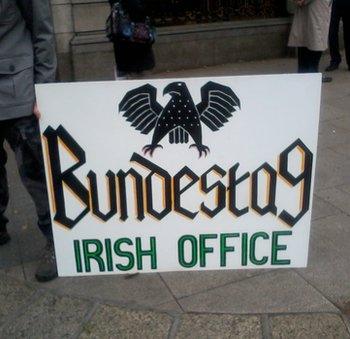Will fiscal treaty poll be a victory for fear or fury?
- Published

A lone protestor stood outside the Dail holding a poster calling Dublin's Parliament the Irish office of its German counterpart, the Bundestag
It is often said that the Irish, unlike the Greeks, don't do street protests when they're angry with a government; instead, they wait patiently until there's a chance to cast their ballots and then give full vent to their fury.
Enda Kenny's Fine Gael and Labour Party coalition will be hoping that's not the case in the fiscal treaty referendum.
The treaty aims to stabilise the euro by getting those countries using the currency to manage and control their debts.
Nobody doubts that the Irish are angry about the increased taxes and cutbacks to public spending caused by bailing-out banks that gambled recklessly during the Republic's Celtic Tiger property bubble.
Alternative
Nor can the Taoiseach be under any illusion that people feel immensely let down by his government.
The impression given during last year's general election campaign was that there was an alternative to austerity and paying back money to the bust banks' bond-holders.
Instead he will be hoping that the huge fear of the unknown about where Ireland will get its money from, should it need a second bail-out, will trump that anger.
And the likelihood is that the country will need a second bail-out loan to pay its generous social welfare and public sector wages but the Fiscal Treaty says that only those countries that have signed up to it can avail of the vast insurance policy known as the European Stability Mechanism.
No matter which side wins the referendum, austerity for another few years seems certain.
Perhaps another reason the Irish don't take to the streets is the weather.
Yesterday's rain in many parts of the Republic affected the numbers voting; many believe that the lower turn-out favours the No side even though all the polls have suggested a 60% Yes majority - we'll see!
Protestor
A No vote would certainly be welcomed by a lone protester who has in recent days stood outside the Dail holding a poster calling Dublin's Parliament the Irish office of its German counterpart, the Bundestag.
Indeed there has been a certain anti-German sentiment during much of the campaign; one radio show featured a piece of musical satire in which two comedians sang "We're German" with appropriate words to the tune of Bob Marley's Jammin'.
Because Ireland doesn't have a veto over the fiscal treaty there's not quite the same international interest in this referendum as there has been in previous Irish-EU polls.
Many of those news crews that intended to come to Dublin have instead headed for Madrid with many believing that Spain is on the verge of needing a bail-out because of its banking problems, which would push the troubled euro into an even bigger crisis.
And because there are still questions about Greece's continued membership of the Eurozone many commentators wonder about the viability of the euro as a currency.
The Irish, like the Greeks, don't like increased taxes and cutbacks; but the question that will be answered later is whether they prefer uncertainty about the future of the euro and where further money will come from - and at what cost - to anger about austerity.